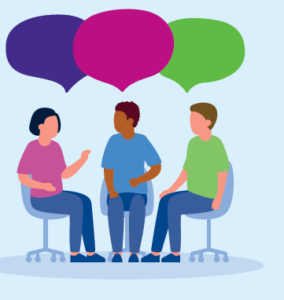HIV doesn't define me
 Hard-hitting headlines in the 80s about HIV being a death sentence or a plague only affecting certain groups still linger in some people’s minds. One group is working
Hard-hitting headlines in the 80s about HIV being a death sentence or a plague only affecting certain groups still linger in some people’s minds. One group is working
hard to finally end the stigma and fear around HIV and to offer support to those struggling with their diagnosis.
It’s 40 years since AIDs and later HIV was discovered. Modern treatment now means people with HIV can enjoy long, healthy lives and once they’re on effective medication and the virus becomes undetectable in their blood, they cannot pass it on to others. Yet people with HIV still face discrimination and worry about sharing their HIV status with friends, family or colleagues, leading to feelings of shame and isolation.
A group of patients with HIV from east Kent and Medway came together in 2020 to think about ways they could offer emotional support to those coming to terms
with a new diagnosis. The ‘Talking Together’ group met virtually every month during the pandemic. Members offered support to each other on topics including dating or parenting with HIV, issues with medication or mental health issues. They have gone on to attend conferences together and meet face-to-face at social events.
One participant said: “I feel part of something. I have a place where I don’t have to hide that part of myself.”
The group felt there was a need to offer more individual support and set up a one-to-one mentoring project in 2021 to share their experiences and offer hope to newly diagnosed people. Four have trained as volunteer mentors with 17 clients taking part in the programme so far. One said: “My mentor put me at ease. She was aware I was anxious and upset about my diagnosis at my age. I’m so pleased I had the support.”
The group is not stopping there and last year set up a peer champion programme to raise awareness of the #CantPassItOn campaign with the public by sharing their
stories and raising money for KCHFT’s charity, icare. Steve Bamford has raised more than £4,000 for the group so far and spoken on local radio and TV shows about living his life positively with HIV.
One of the group said: “Being HIV positive doesn’t change me. HIV doesn’t define me. I hope I can be an example of hope to others, that life with HIV isn’t so bad.”
The group hopes their stories can be an inspiration for others that you can live healthily with HIV. One participant said: “I have become more relaxed about having HIV. Seeing others living well and not being defined by HIV can be a real beacon in the dark, because you can feel you’re the only one dealing with it. Getting tested and on the right medication really could save your life.”
Desre Bean-Engelbrecht, Trainee Project Support Manager, said: “It has been a pleasure watching the group make new connections, express and share their experiences and feelings openly and see their confidence grow as a result.”
If you want to find out your status, testing for HIV is free, quick and easy. Visit www.kentcht.nhs.uk/hiv for information on testing and support for HIV positive people, including the Talking Together group.



